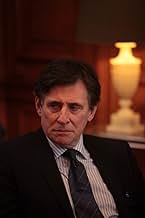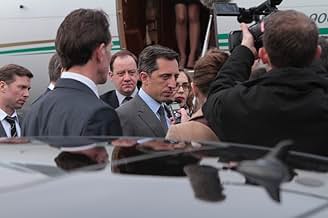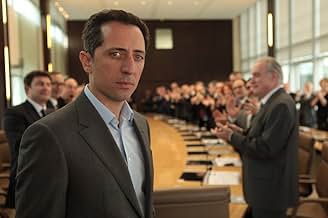CALIFICACIÓN DE IMDb
6.5/10
5.8 k
TU CALIFICACIÓN
El recién nombrado director ejecutivo de un banco de inversión europeo gigante, trabaja para mantener su poder cuando una empresa estadounidense de fondos de cobertura intenta comprar su emp... Leer todoEl recién nombrado director ejecutivo de un banco de inversión europeo gigante, trabaja para mantener su poder cuando una empresa estadounidense de fondos de cobertura intenta comprar su empresa.El recién nombrado director ejecutivo de un banco de inversión europeo gigante, trabaja para mantener su poder cuando una empresa estadounidense de fondos de cobertura intenta comprar su empresa.
- Dirección
- Guionistas
- Elenco
- Premios
- 1 premio ganado y 2 nominaciones en total
Opiniones destacadas
If there is one message that the movie is trying to communicate to its audience it's the above title.
There are of course reviews that point out the alleged likeliness of this film with movies like "Wall Street" usually concluding "that there is nothing new to see". Under closer examination however, any similarities between the two films go only skin-deep and can only be considered superficial. There are fundamental differences between these two movies because they represent two different approaches and evaluations of the same issue and which one hits home is up for you to decide. And thats because "Wall Street" focuses on the seducing power and aloofness of a loan shark that acts as a money fueled lone wolf, as opposed to the naiveness of a young rookie which is slow to disillusion himself about his own actions while he's getting carried away (but eventually comes out on top etc). The caveat of such scenarios is in that they constantly, silently and almost purposefully marginalize the inherent, all consuming, self-perpetuating environment and ill-conceived culture that money in and all by itself creates, even for "the winners of the game".
La Capital on the other hand has none of the above shortcomings when it comes to describing the black hole lurking deep into the very foundations of our culture: Money. It's a film about attitudes and value systems across the board, with a scenario that's free of cliché good-guy-vs-bad-guy dualities and with the courageous nerve to "pull no punches" sparing its viewer from having to suffer another stereotypical "happy ending" made-in-Hollywood (has elements of it but still its not "right into your face").
Finally, I would just like to add that, all in all, Mr Gavras is right in that there will come a time in the not so distant future ... A time in which, among other things, our western culture will look back to the contemporary intellectuals and artists to examine which ones did of their duty in terms of articulating the public opinion, bringing the spotlight on the machinations of the financial system and the corrosive effects that money in and all by itself has both on our societies as a whole, in our own micro-worlds and those of our acquaintances as well as our own fragile, individual psyches. And when this time comes I think that the memory of both Mr Gavras and those that stood by him in this and similar projects will be, if not exalted, then at the very least spared from the outrage of the dystopian poverty-striken masses.
There are of course reviews that point out the alleged likeliness of this film with movies like "Wall Street" usually concluding "that there is nothing new to see". Under closer examination however, any similarities between the two films go only skin-deep and can only be considered superficial. There are fundamental differences between these two movies because they represent two different approaches and evaluations of the same issue and which one hits home is up for you to decide. And thats because "Wall Street" focuses on the seducing power and aloofness of a loan shark that acts as a money fueled lone wolf, as opposed to the naiveness of a young rookie which is slow to disillusion himself about his own actions while he's getting carried away (but eventually comes out on top etc). The caveat of such scenarios is in that they constantly, silently and almost purposefully marginalize the inherent, all consuming, self-perpetuating environment and ill-conceived culture that money in and all by itself creates, even for "the winners of the game".
La Capital on the other hand has none of the above shortcomings when it comes to describing the black hole lurking deep into the very foundations of our culture: Money. It's a film about attitudes and value systems across the board, with a scenario that's free of cliché good-guy-vs-bad-guy dualities and with the courageous nerve to "pull no punches" sparing its viewer from having to suffer another stereotypical "happy ending" made-in-Hollywood (has elements of it but still its not "right into your face").
Finally, I would just like to add that, all in all, Mr Gavras is right in that there will come a time in the not so distant future ... A time in which, among other things, our western culture will look back to the contemporary intellectuals and artists to examine which ones did of their duty in terms of articulating the public opinion, bringing the spotlight on the machinations of the financial system and the corrosive effects that money in and all by itself has both on our societies as a whole, in our own micro-worlds and those of our acquaintances as well as our own fragile, individual psyches. And when this time comes I think that the memory of both Mr Gavras and those that stood by him in this and similar projects will be, if not exalted, then at the very least spared from the outrage of the dystopian poverty-striken masses.
Very interested 2012 French film by Costa Garvas. Shows how a large French bank operates in the world's financial market and how it integrates into the international banking system. An aging CEO is replaced by a younger executive. He finds himself with a lot of internal and external pressures. Some scenes of it reminds of Wall Street 2. A different approach to the financial market at a fast pace, in some moments too fast to follow and grasp. Also shows the relationships between the different executives and its lower level employees when the new CEO starts laying off people to tune up the finances of the bank with ruthless practices and little concern about employees needs and their respect. Worth while seeing.
Let's continue to rob the poor and make the rich richer!" this is what about the modern day banking and financing (undre)world, banks are just like Mafia, bankers Mafiosos, banks' CEO in private jet doing country hopping, hiring retired cop to do the dirt-digging and trashcan/dumpster diving jobs, committing some adultery flirting with high priced model- hooker, back-stabbing while self defense, behind the door deals, estranged to parents, wives, kids, fence off hostile takeover, firing the employees as many as possible, no gender and age are safe, laying off more, the stockholders will be happier and the stock will be rocketing. so, indeed "money is not a tool but a master, serving him well and he'll reward you generously". so let's continue to rob the poor blind and serve the rich loyally. what a great movie, very tense and thrilling, great montage, lot of exotic locations in different countries. this is a very nicely done movie, quite worth watching.
Le Capital follows the course of a newly-appointed CEO of a hypothetical major French bank with global reach. The protagonist is a smart, ambitious and hard-nosed executive, but the constant pressures he faces at the helm of Phenix Bank from his board, which didn't favor his taking command but feel they can control him, from his employees who are unclear as to the direction in which he wants to take Phenix Bank compared to his cancer-stricken predecessor, and most keenly from his shareholders, particularly a U.S.-located hedge fund, almost want to make you sympathize with him. But his ruthless, hard character and the cold but correct way he treats his family ultimately prevents this identification. (I've read that the actor portraying the CEO is a comedian on French television so this must be quite a switch for him.)
The heart of the film is the pressure that the American hedge fund, as represented by a character who would put Gordon Ghecko to shame, places on the CEO to initiate drastic actions to pump the stock price. Apparently, the hedge fund has acquired a dominant position in Phenix's stock that enables it to virtually dictate policy to the bank, or at least to this CEO. Of course the dictation is smoothed by the fact that he's promised huge bonuses to implement these "suggestions". The initial directive is to fire 10,000 of the bank's employees which he does gratified by the promised bonus and seemingly unconcerned by the fact that "his" bank does not appear to have an excess labor force. The final "directive" is for Phenix Bank to make an acquisition of a troubled Japanese bank with poor assets. At last some resistance begins to form in our CEO because he senses he'll be the "fall guy" for such an ill-advised acquisition and that the adverse impact of such an acquisition on Phenix's stock price would apparently enable the hedge fund to acquire complete control of the bank at a cheaper price. (One could nitpick and say that the filmmakers in their anti-capitalist bias are confusing corporate raiders who do hostile takeovers with hedge funds who are content to be "activist" investors and prod the company's management and not manage the company. Moreover, why would the hedge fund want to manage the troubled assets of the Japanese bank as part of the larger Phenix Bank, particularly if they were acquired with cash most likely burdening Phenix Bank with much increased debt? A stock-for-stock exchange might affect the target bank's shareholders with a lower value for their stock.) What the CEO ultimately does about the Japanese bank and his erstwhile hedge fund friends I'll leave for those who choose to view this film. I, for one, enjoyed it. I found the banking scenes to be interesting and the characterizations to be provocative although in some cases over the top. For non-French speakers like this English speaker, I think you'll need to go back a bit a number of times on a DVD to refresh the sub-titles in order to follow the financial ramifications of the plot.
The filmmakers' attitude toward high-finance capitalism is most apparent in an amusing but over-the-top scene where our banking CEO says in an opulent boardroom among well-dressed board members that our new paradigm is to "rob from the poor and give to the rich" to which he's met with enthusiastic applause. I'm sure the vast majority of bankers don't believe this or follow this goal explicitly; however, their actions may sometimes indeed perform this transfer of wealth, e.g., the LIBOR interest rate manipulation which served to enrich banks and their usually wealthy shareholders (but also including 401k holders) but increased the cost to homeowners with variable-rate mortgages. I would guess the basic question underlying films like "Capital" is whether economic systems like capitalism promote the kind of greed and exploitation we see in "Capital" or whether greed-filled and exploitative people perform their misery in any kind of system (for you socialists out there, socialism did not really end greed and exploitation; it was just manifested in another form, the form of political power and perks). Perhaps the filmmakers' message is that financial capitalism allows monetary greed to be more fully realized.
The heart of the film is the pressure that the American hedge fund, as represented by a character who would put Gordon Ghecko to shame, places on the CEO to initiate drastic actions to pump the stock price. Apparently, the hedge fund has acquired a dominant position in Phenix's stock that enables it to virtually dictate policy to the bank, or at least to this CEO. Of course the dictation is smoothed by the fact that he's promised huge bonuses to implement these "suggestions". The initial directive is to fire 10,000 of the bank's employees which he does gratified by the promised bonus and seemingly unconcerned by the fact that "his" bank does not appear to have an excess labor force. The final "directive" is for Phenix Bank to make an acquisition of a troubled Japanese bank with poor assets. At last some resistance begins to form in our CEO because he senses he'll be the "fall guy" for such an ill-advised acquisition and that the adverse impact of such an acquisition on Phenix's stock price would apparently enable the hedge fund to acquire complete control of the bank at a cheaper price. (One could nitpick and say that the filmmakers in their anti-capitalist bias are confusing corporate raiders who do hostile takeovers with hedge funds who are content to be "activist" investors and prod the company's management and not manage the company. Moreover, why would the hedge fund want to manage the troubled assets of the Japanese bank as part of the larger Phenix Bank, particularly if they were acquired with cash most likely burdening Phenix Bank with much increased debt? A stock-for-stock exchange might affect the target bank's shareholders with a lower value for their stock.) What the CEO ultimately does about the Japanese bank and his erstwhile hedge fund friends I'll leave for those who choose to view this film. I, for one, enjoyed it. I found the banking scenes to be interesting and the characterizations to be provocative although in some cases over the top. For non-French speakers like this English speaker, I think you'll need to go back a bit a number of times on a DVD to refresh the sub-titles in order to follow the financial ramifications of the plot.
The filmmakers' attitude toward high-finance capitalism is most apparent in an amusing but over-the-top scene where our banking CEO says in an opulent boardroom among well-dressed board members that our new paradigm is to "rob from the poor and give to the rich" to which he's met with enthusiastic applause. I'm sure the vast majority of bankers don't believe this or follow this goal explicitly; however, their actions may sometimes indeed perform this transfer of wealth, e.g., the LIBOR interest rate manipulation which served to enrich banks and their usually wealthy shareholders (but also including 401k holders) but increased the cost to homeowners with variable-rate mortgages. I would guess the basic question underlying films like "Capital" is whether economic systems like capitalism promote the kind of greed and exploitation we see in "Capital" or whether greed-filled and exploitative people perform their misery in any kind of system (for you socialists out there, socialism did not really end greed and exploitation; it was just manifested in another form, the form of political power and perks). Perhaps the filmmakers' message is that financial capitalism allows monetary greed to be more fully realized.
I have seen the posters. Gad Elmaleh and Costa Gavras? Well, Costa Gavras directed nobodies like Ion Caramitru, so why not a stand up comedy man? Than I have read the reviews. The world is not like that, they say.
I have watched the movie. Maybe there are a bit too many characters on screen. I can say that of all of Costa Gavras' movies I have seen so far. But the story is good. And it's the best business-themed movie I have seen.
So what I can tell you is go see the movie and find for yourself if you like it. Just keep in mind this is not a reality TV show about white collar crime. Maybe it's true that the television has a strong impact on the way audiences perceive the big screen stories.
Contact me with Questions, Comments or Suggestions ryitfork @ bitmail.ch
I have watched the movie. Maybe there are a bit too many characters on screen. I can say that of all of Costa Gavras' movies I have seen so far. But the story is good. And it's the best business-themed movie I have seen.
So what I can tell you is go see the movie and find for yourself if you like it. Just keep in mind this is not a reality TV show about white collar crime. Maybe it's true that the television has a strong impact on the way audiences perceive the big screen stories.
Contact me with Questions, Comments or Suggestions ryitfork @ bitmail.ch
¿Sabías que…?
- ErroresIn a dinner scene towards 67 minutes into the film, the liquid level in a bottle in front of Marc Tourneuil keep on changing between shots.
- Citas
L'oncle Bruno: Your bank makes money and you lay people off. How do you cope?
Selecciones populares
Inicia sesión para calificar y agrega a la lista de videos para obtener recomendaciones personalizadas
- How long is Capital?Con tecnología de Alexa
Detalles
Taquilla
- Total en EE. UU. y Canadá
- USD 101,700
- Fin de semana de estreno en EE. UU. y Canadá
- USD 22,400
- 27 oct 2013
- Total a nivel mundial
- USD 4,822,849
- Tiempo de ejecución
- 1h 54min(114 min)
- Color
- Mezcla de sonido
- Relación de aspecto
- 2.35 : 1
Contribuir a esta página
Sugiere una edición o agrega el contenido que falta



































